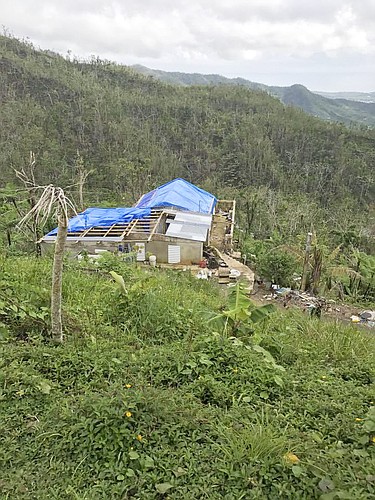- April 15, 2024
-
-
Loading

Loading

She knew once she got into the thick of the devastation, her life would never be the same.
A nurse practitioner of more than 30 years, Nancy Rudner had lived in under-resourced countries facing difficulties before, but nothing had compared to this.
The toll of Hurricane Maria on Puerto Rico was absolute. To this day, most of the island still doesn’t have electricity and most natives struggle to survive.
“The destruction was incredible — we saw forests where every leaf had been stripped off, every tree was down,” Rudner said. “I saw one house where the roof had blown off, and it’s mountainous there, and they could see their roof on the other mountain. And there were a lot of places where you could see a bed, because all the walls were gone.”
Before Rudner’s trip to Puerto Rico in November, she helped lend a hand at a pop-up response center at the Orlando International Airport. There, alongside Shepherd’s Hope, Rudner was able to perform medication refills to help keep those arriving from the island from having to make a trip to the emergency room.
Rudner had volunteered with Shepherd’s Hope, a faith-based organization of volunteers that help provide health care to the needy, for about 20 years and was inspired to go down to the island to help.
She, along with a small team of physicians and nurses, were sent down on short notice to help provide medical aid during a two-week span.
“It’s kind of a blur,” Rudner said of her first day in Puerto Rico. “We held a clinic at the church. People came in and they got information about mosquitos, and they got information about water filters, and we gave out vaccines for tetanus and flu.”
From there, Rudner and the others would move about from place to place — making home visits and setting up clinics wherever they could find space.
The adventure took them through the countryside and deep into the mountains, where Rudner traversed narrow goat paths to get to those who needed aid.
They handed out medication, gave vaccines and helped treat the poor and sick as best they could. In addition to the medical care they provided, Rudner and her team also did something simple, yet incredibly effective — they listened.
“The other reason I went is because I speak fluent Spanish, and I think it’s very helpful there,” Rudner said. “You can talk to people there through an interpreter for basic stuff, but some people just came to talk to me and they were so overwhelmed and so depressed, and I would say, ‘I don’t know what I can do to help you,’ and they’d say, ‘I just needed to talk to someone.’”
Although Rudner could help provide medical care and listen to the people’s struggles, she was helpless as it related to food shortages and a crumbling infrastructure. Most grocery stores had been destroyed, and those that did have a little food saw price gouging on items — making them basically untouchable for most on the island.
The fields that had been used as farmland to grow crops had largely been mowed down by the storm, so locals couldn’t even get to fresh foods, Rudner said.
Instead, they relied on MREs, which were handed out by the government. While still sustenance, MREs are not the healthiest meals.
“They are good in a disaster, because they are food — but they are high in salt and sugar, so we saw a lot of people with really high blood-pressure and high blood-sugar levels,” Rudner said. “And there were no fresh fruits and vegetables — this is a tropical island.”
Despite the sadness that came along with seeing those struggling on the island, Rudner came back to Central Florida with a small sense of accomplishment, though she knows the job is far from done.
The want to help those in need down in Puerto Rico has become so strong that Rudner has returned to the island with another group to continue working.
“What we are going to be doing is supporting the clinics that are there — there is a pretty good healthcare system in Puerto Rico, but they are overwhelmed,” Rudner said. “So we are going to be doing home visits, which is really a wonderful way to provide care.”